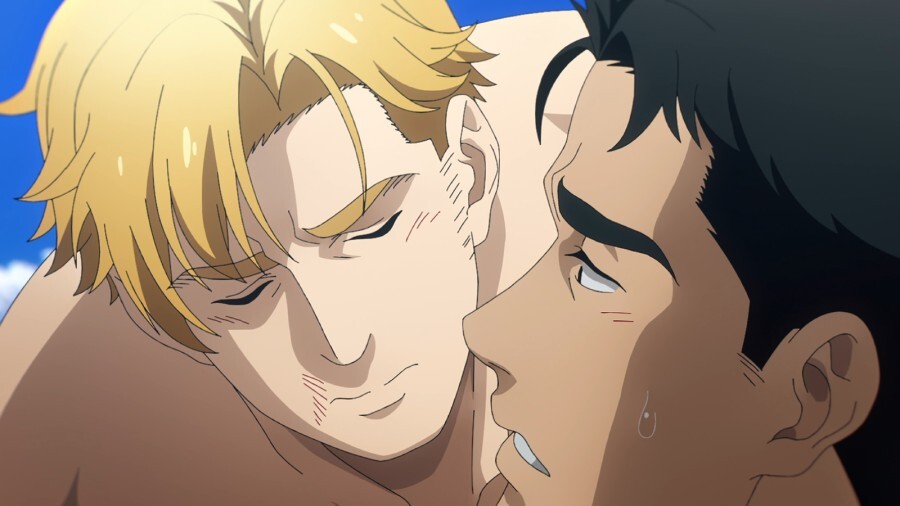It is, perhaps, dangerous to make accusations like “being a masterpiece” when talking about a show that is, at the time of this writing, still airing. However, there is little in animation—or storytelling as a whole—anywhere in the world right now, much less in Japan, that is as defiant and fascinating to watch as the latest Cygames production Bang Brave Bang Bravern.
And a not insignificant reason for that is how absolutely, fearlessly, beautifully queer the entire show has been to this point.
Where Bang Brave Bang Bravern came from (and where its going)
But, its queerness is also only one thread in the rich tapestry of its story. Often shortened to just Brave Bang Bravern in North American media, this show is the latest work from legendary anime director Masami Ōbari, a man whose resume dates back to the mid 80s. He’s a multifaceted talent whose credits include mech design for Bubblegum Crisis and director for Gundam Build. Most importantly to the pedigree of Brave Bang Bravern, he was also a key animator (and eventually, animation chief) of several entries in the Brave anime series, a super robot show that Brave Bang Bravern is clearly influenced by, if not an unofficial spinoff of.
That’s a lot of jargon to throw at the uninitiated. But, the show’s thesis statement includes the pedigree and the people involved in the production. To fully unwrap why that is, this writer encourages you to watch the first episode before reading any further. Even if you’ve never seen an anime before, what the show does with its setup is patently obvious by the time the credits roll, and you will have a reaction.
Here’s the trailer that aired before the show came out. It is only half of the truth.
From here on out, expect some amount of spoilers for what has aired thus far.
A queer show built on media subversion
If you’re reading this, you’ve either watched the first episode over on Crunchyroll, or you don’t mind spoilers. So, let’s get the text out of the way before talking about the subtext: Brave Bang Bravern is both a loving parody and deconstruction of multiple genres. On its face is a world of gritty, hard-nose military sci-fi, the likes of which probably goes down easier for the traditional Western palette. But underneath the surface from the very first line of the show, right up until the final moments of the first episode, is a passionate, frequently silly but always self-aware send-up of the Super Robot Genre.
The titular Bravern, a sentient humongous robot that sweeps up the main character into his cockpit as a reluctant pilot, appears at the 11th hour to save humanity from a violent and brutal alien invasion. But, despite his quirky personality and colorful special attacks, this Super Robot’s named attacks and diegetic theme music don’t change the rules of the military sci-fi world, but instead brush violently against them. Everything Bravern and the alien invasion does has real world consequences for the people of Earth, and every nanosecond of screen time is an exploration of how these two genres may or may not be able to coexist.
And a homoerotic relationship between two male characters, Japanese pilot Ao Isami and American Marine Lewis Smith, plainly represents that battle of dual genres.
Lewis and Isami as star-crossed lovers and genre representatives
Brave Bang Bravern‘s choice to represent its genre-conflict via the vehicle of a will-they/won’t-they gay romance is as daring as anything else the show has going on. In a narrative that frequently has a talking robot break the fourth wall via summoning his action sequence’s special effects into the real world, it’s the homoerotic tension between Lewis Smith (a tokusatsu loving American that seems Isami as both a potential lover and as a worthy heir of the heroic giant robot, even if it’s he who wants to pilot it) and Ao Isami (a stoic Japanese solider who firmly rejects the silliness and over-the-top nature of Bravern, but every new detail about Lewis’s personality seems to give him pause) that has served as the central anchor for both the show’s plot and the discourse surrounding it.
RELATED: Our Favorite Gay Games of 2023 (And Why Games Will Be Gayer in 2024)
What the show is actually about.
To reinforce this, a consistent trend in the show is the use of tropes as antagonistic devices. When the obstacles that face the now war-torn Earth aren’t invading robot aliens, they are hetero-normative plot devices: multiple female characters have appeared in front of Lewis and Isami in ways that, in any other show, would lead to some sort of romance.
Heteronormativity as a foe to defeat
Lewis and Isami consistently sidestep these tropes in a manner that would unmistakably indicate their intentions, even to the most oblivious observer. Lewis walked into the women’s locker room? Hours of sweaty cardio with the boys left him too tired to react to the other characters in there. It’s to the point that the women are more offended that he didn’t nosebleed immediately upon seeing them! A busty Japanese female soldier gives a blushing confession of her long-time admiration to Isami? He has less of a reaction to that than he does to finding out Lewis waxes his body. The show threw an alien loli at Lewis—for an annoyingly vocal portion of straight anime watchers, the final boss of merchandising—and he became a gay step-dad and made her watch the in-universe equivalent of Kamen Rider and eat curry.
Everything about the show is set up so intentionally that to deliver anything other than Lewis and Isami finally falling for each other—no matter what that form takes—would be a far bigger travesty than anything else that happens on the show.
Despite everything, it can still fail—and that’s the biggest drama of all
If you’re here at The Gay Goods, you probably don’t need to have queer-baiting explained to you. The art of paying lip-service to gays just enough to get their money without actually doing anything of substance is a time honored tradition among big corporations, and the anime industry is no exception to this. Many shows have come before Brave Bang Bravern teasing gay romances that never go anywhere, and certainly many will follow suit.
What hopefully sets Brave Bang Bravern apart from those is how much of its narrative revolves around Lewis and Isami. It is the way they circle each other that makes up the show. For God’s sake, look at the ending sequence. Look at how Lewis squeezes Isami’s hand first, the more desperate one to reach out. The details, lovingly rendered in every frame and in every utterance, are so over-the-top in the way they are laid out that if Brave Bang Bravern doesn’t deliver on it’s central premise, it won’t just let the show down: I personally think it’ll tarnish the legacy of Obari as a creator.
On Friday, a new episode airs of Brave Bang Bravern. Every new episode terrifies gay anime fans, as they fear it might be the one where the rug gets pulled out from under them. At least, that’s how I’ve felt watching the show—and yet, every time I think that, there’s a dry-humping boxing match, or Isami blushes at something related to Lewis. If Obari truly wants to cement himself as one of anime’s most daring directors, there’s the gayest, most shirtless, most triumphant kiss in this show’s future. Otherwise, this article were merely be a headstone for the possibilities of what could have been a genre-defining work.
You can watch Bang Brave Bang Bravern on Crunchyroll.
Get real time update about this post category directly on your device, subscribe now.





1 comment
Honestamente no tengo nada que decir…el anime se define solito y lo peor es que estoy viendo por segunda vez este anime bang brave bang bravern, creo que resumen está bien hecho y es una cosa digamos buena, a pesar de que a muchos no les guste edta temática improvisada, pero siento que hizo falta algo para que se concretara, Lewis es una fantasía del hombre macho rubio extrovertido y en cuanto a Isami es el tipico hombre estoico gay de closet reprimido… No es crítica es buena y me identifico con este género difícil de creer????